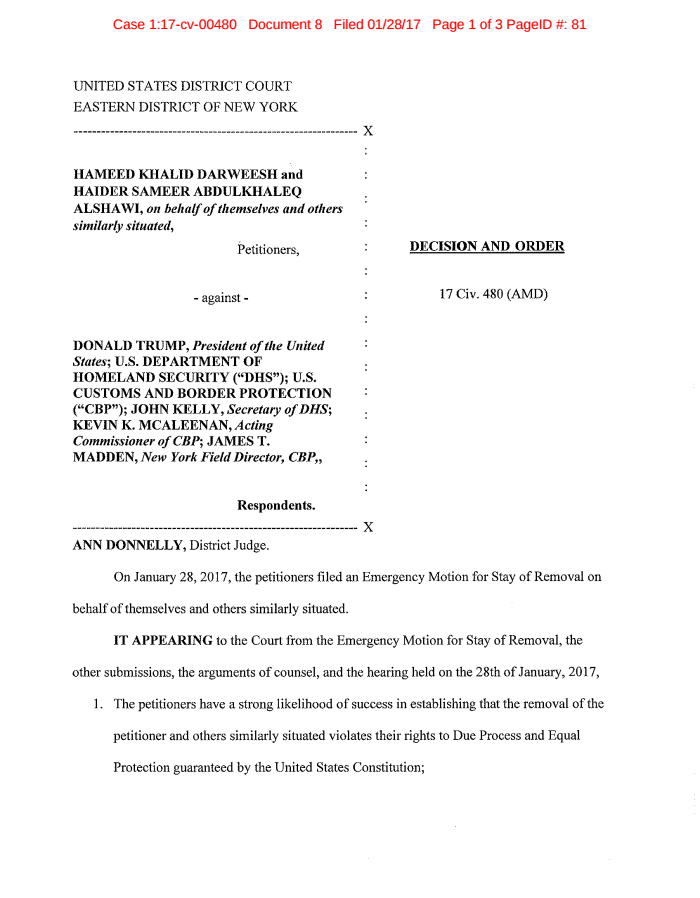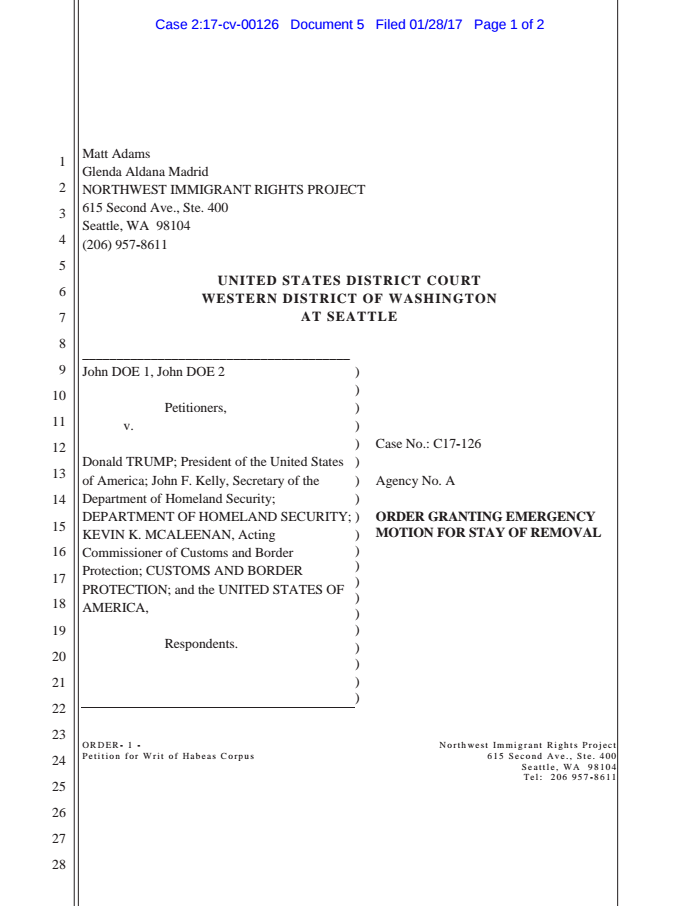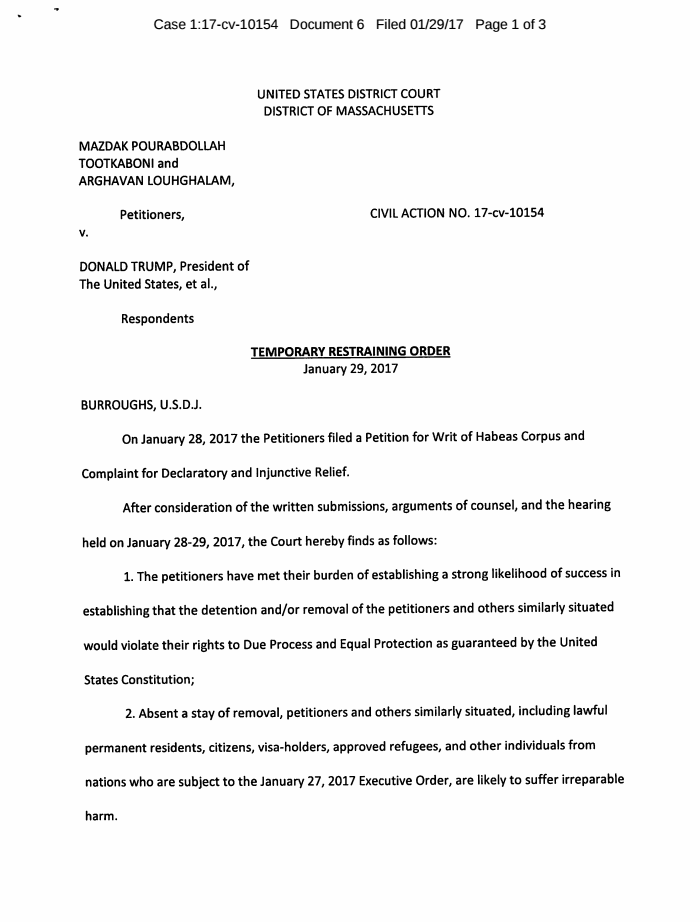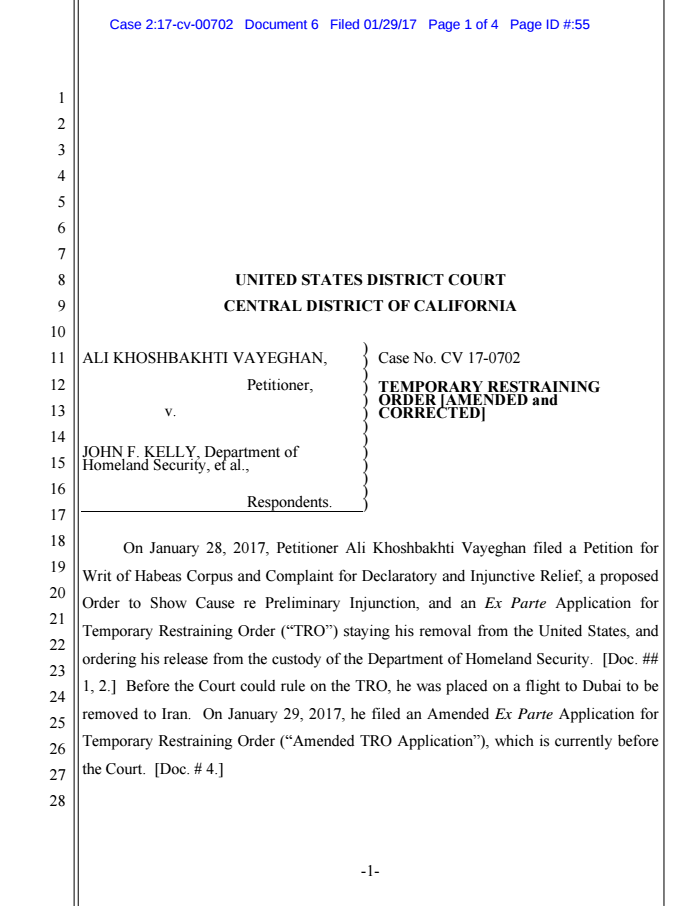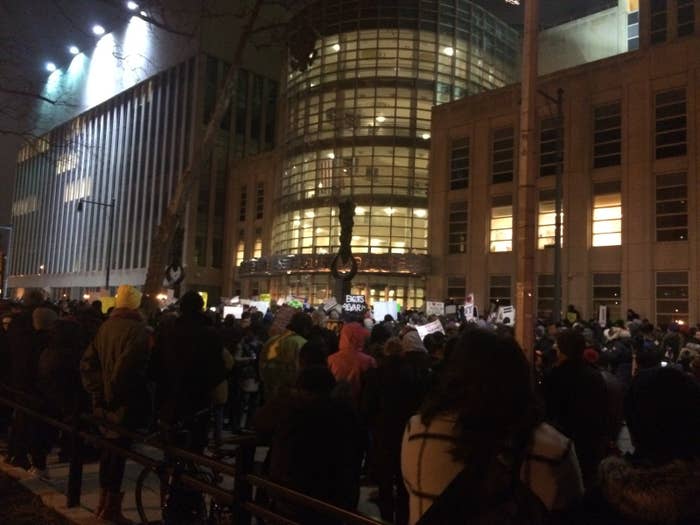
Less than 36 hours passed after President Trump signed his executive order on Friday restricting immigration on several fronts before four federal judges had issued rulings in quick succession blunting the effect of the order and calling its constitutionality into question.
The executive order — "Protecting the Nation From Foreign Terrorist Entry Into the United States" — temporarily halted the US refugee program for 120 days; indefinitely suspended the intake of refugees from Syria; and blocked all people from Syria, Iraq, Iran, Sudan, Somalia, Libya, and Yemen from entering the US for 90 days.
The moves against the order started when a federal judge in Brooklyn on Saturday evening granted a nationwide stay of removal — preventing deportation — for those people affected by the order.
"Nobody is to be removed," US District Judge Ann Donnelly told the government lawyers, issuing the stay after holding the first hearing on a challenge to the order.
In the order that followed, Donnelly barred federal officials from removing those with approved refugee applications, valid immigrant and non-immigrant visas, and individuals from the seven countries where all immigration was halted who are otherwise legally authorized to enter the US. Those seven countries are Iran, Iraq, Libya, Somalia, Syria, Sudan, and Yemen.
Several hours later, after a late-night hearing in a federal courthouse in Massachusetts, US District Judge Allison Burroughs and Magistrate Judge Judith Dein issued an order early Sunday morning that — as the petitioners' lawyers had requested — went further, barring federal officials from detaining, in addition to removing, the same group covered by Donnelly's order and adding those same protections, explicitly, to lawful permanent residents.
Additionally, Burroughs and Dein's order limits secondary screening to pre-Trump order status and order US Customs and Border Protection to "notify airlines that have flights arriving at Logan [International] Airport of this order and the fact that individuals on these flights will not be detained or returned solely on the basis of the Executive Order."
Overnight, there remained questions about the scope of the orders — lawyers in the New York case already are seeking clarification from the court there and the Massachusetts case only named two petitioners. The Department of Homeland Security put out a statement overnight — but prior to the decision in Massachusetts — declaring, "President Trump’s Executive Orders remain in place — prohibited travel will remain prohibited, and the U.S. government retains its right to revoke visas at any time if required for national security or public safety." At the same time, however, the agency acknowledged that it "will comply with judicial orders."
Nonetheless, the explicit terms of the two court orders — which combine to limit federal officials from detaining or removing those affected by Trump's executive order — contain no explicit limitation to the respective districts or states in which they were granted.
In addition to those two rulings, two more localized rulings came from federal courts in Virginia and Washington. In the case filed in the US District Court for the Eastern District of Virginia, US District Judge Leonie Brinkema ordered federal officials to provide lawyers access to "all legal permanent residents being detained at Dulles International Airport" and barred officials from deporting any such people for the next seven days. In the case out of Washington state, US District Judge Thomas Zilly barred the federal government from deporting two unnamed individuals from the US. Zilly set a hearing for Feb. 3 "to determine whether to lift the stay."
On Sunday afternoon in California, US District Judge Dolly Gee issued a potentially ground-shifting order — requiring the federal government to return Ali Khoshbakhti Vayeghan, who had been deported and slated to be returned to Iran under Trump's order, back to the US.
The New York-based lawsuit that started things rolling had been brought early Saturday on behalf of Hameed Khalid Darweesh and Haider Sameer Abdulkhaleq Alshawi, two men detained at John F. Kennedy International Airport for several hours after their arrival at the airport in the wake of Trump's signing of the ban.
In addition to the two men, however, the group of lawyers backing the men also filed a motion to turn the lawsuit into a class action, which would result in protection for all of those who would be covered by the class.
Later, they sought immediate action, filing a request that the court issue a stay of removal — an order preventing deportation — not only for the two men, but for the entire proposed class.
At the hearing in the first case, Donnelly focused in on whether the people affected by Trump's order would face irreparable harm if deported.
Gisela Ann Westwater, a lawyer from the Justice Department's Office of Immigration Litigation, presented the bulk of the government's defense over the phone, with support from Susan Riley, who was in person at the hearing.
While discussing whether irreparable harm would be brought onto people who were detained and would be sent back to the countries they came from, the judge referenced an unnamed person who the ACLU's Lee Gelernt, who argued for the challengers, said was being sent back to Syria.
Donnelly turned to the government's lawyers, asking, "What do you think about that?" Westwater began to make the case, briefly, about concerns based on those trying to come to the US on tourist visas.
The judge, however, interrupted her and delivered her order, questioning whether "the government had a full chance to think about this.”
At another point in the hearing, Gelernt told Donnelly that the petitioner's lawyers estimate 100 to 200 people are being detained across the country as a result of Trump's order.
When Gelernt pressed for the government to turn over names of those detained and the government responded that it did not know who all of those people being detained are, Donnelly said the government should compile a list.
In a follow-up order to the stay, Donnelly ordered the government "to provide a list of individuals detained, pursuant to the January 27, 2017 Executive Order, to the petitioner's counsel."
Further proceedings in the case, ultimately challenging the constitutionality of Trump's order, are set for February. The government's brief responding to the petition is due Feb. 10.
The lawyers who brought the case come from International Refugee Assistance Project, National Immigration Law Center, American Civil Liberties Union Foundation, and the Jerome N. Frank Legal Services Organization at Yale Law School.
The Massachusetts court's order, meanwhile, will remain in effect for 7 days, with the court to schedule a further hearing before that time.
Read the order in the Virginia case:
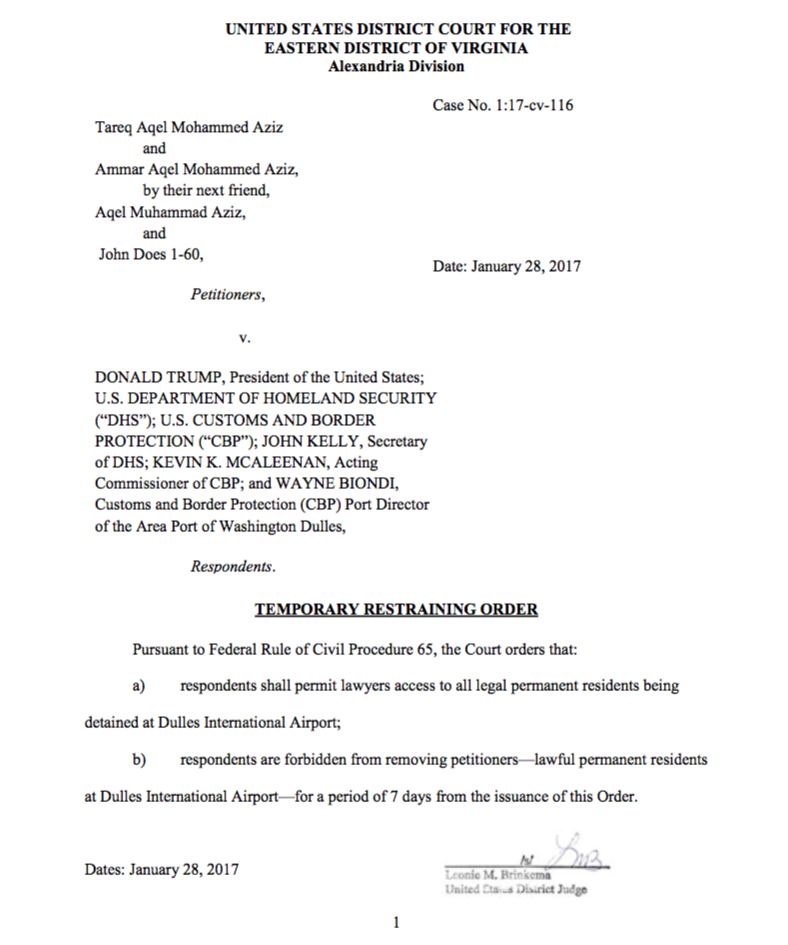
This is a developing story. Please check back at BuzzFeed News for more.



